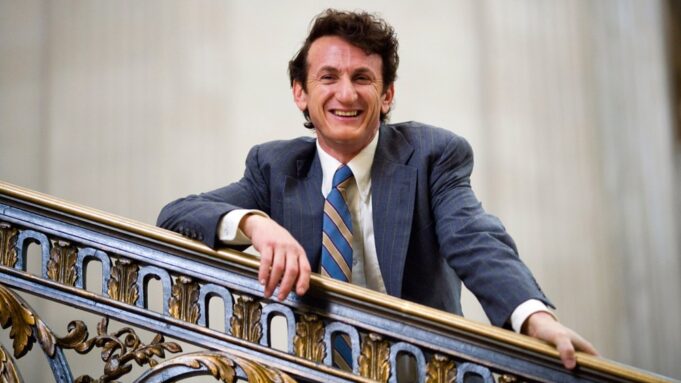Could Sean Penn make “Milk” today?
It’s a question the actor answered himself, in a recent profile by Maureen Dowd in the New York Times. “It could not happen in a time like this,” he said, of his performance as the slain gay politician. “It’s a time of tremendous overreach. It’s a timid and artless policy toward the human imagination.”
Penn is clearly passionate about the Gus Van Sant-directed film, which won him his second Oscar and which, he says, was “the last time I had a good time” on sets more than 15 years after its 2008 release. He’s part of a class of A-listers from an age where the celebrity class was untouchable, and — like Jerry Seinfeld and Jennifer Aniston — he seems visibly irritated by the shifts in power toward the audience. In fairness, it is perhaps hard to believe that the precise way “Milk” was cast — with not just Harvey Milk but multiple of his fellow queer activists played by actors who appear to be straight — would play out in the same fashion in 2024. (The recent Showtime series “Fellow Travelers,” like “Milk” a historical drama about the LGBTQ civil-rights struggle, featured as its two leads two out gay actors, Matt Bomer and Jonathan Bailey.)
And yet. There was no outcry over Josh O’Connor and Mike Faist playing (at least) hetero-flexible courtship in the recent “Challengers.” Daniel Craig’s Benoit Blanc was revealed to be happily partnered to a man in the last “Knives Out” film. Sterling K. Brown’s character came out, in an blaze of glory, in “American Fiction.” On the path to her recent second Oscar in the queer-coded “Poor Things,” Emma Stone also seduced women in both “Battle of the Sexes” and “The Favourite.” Onstage, Andrew Garfield won a Tony for his Prior Walter in “Angels in America.” And Andrew Scott (who publicly identifies as gay) and Paul Mescal (who does not) very credibly played lovers in “All of Us Strangers.”
None of these projects was met with significant controversy; while I had some notes on Brown’s depiction of a gay awakening (which, in its grandiosity, felt at times caricatured and even dated), the Academy, and a more broad and inclusive one than in the days of “Milk,” at that, saw fit to honor him, just as it had Stone and both of her female costars in “The Favourite.” The final over-the-net embrace in “Challengers” had all of the moviegoing public screaming “Come on!” along with Zendaya. And no less than Scott, likely the most prominent gay actor currently working, is — like Penn, although in a different tone and bringing different experiences to bear — ready to stop talking about these issues entirely. In an interview to promote his role as the depends-on-how-you-read-him gay-adjacent serial killer in “Ripley,” Scott seemed to speak for more than just himself when he told me, “We live in an identity-politics era. We’re separating each other more than we need to. This hysteria about your sexuality and how that is something that is only understandable to people who belong to the same tribe as you — it just doesn’t seem truthful.”
He went on: “Would it be unusual for us not to mention my sexuality at all?”
Scott has played straight, gay and “Ripley”-ish in-between, to great effect. And doing so has vaulted him to leading-man status. But his success, and the success of peers who are no less liberated than had been Penn to experiment and to play across the spectrum, is rooted not in playing it rigorously safe but in experimentation, play, and hard work to understand his characters, no matter who they are or where their sexuality lies.
Love Film & TV?
Get your daily dose of everything happening in music, film and TV in Australia and abroad.
It’s worth taking what Penn said seriously and not dismissing it out of hand. The years after the release of “Milk” were the early years of social media, in which actors could credibly have felt as though their decisions, including which roles to take, were interpreted unfairly. An eagerness to find fault that settled over the cultural-writer class sometime during Obama’s second term eventually dissipated; “Milk” would likely have been pilloried had it come out in, say, 2014, but so might have “All of Us Strangers” and “Challengers.” Today, the answer to questions of who can play what role seems in many cases to be who can dazzle us best.
And it’s certainly true that more thought is given to representation, including and especially when it comes to roles that bear serious cultural impact, than was the case in 2008. A hypothetical 2024 “Milk” is impossible to prove, but, for all the counterexamples I’ve cited to what Penn said, the closest recent film to what “Milk” actually was is “Rustin,” another biographical story of a gay civil-rights leader, headlined by Colman Domingo, an out gay actor.
But is that casting cultural overreach? Or just an acknowledgement that, when it comes specifically to queer history, these types of stories gain a special resonance and depth when told by those who share that history? It’s hard to know if Sean Penn could play Harvey Milk today; it’s also, perhaps, a question that can’t be answered. He already did, the movie exists, and people still watch it and wonder at what he did, how closely he summoned not just Milk’s cadence but his desire, his spirit, his drive. But could Sean Penn play another gay man, one whose remarkable qualities audiences don’t yet know and would be eager to discover? Looking at top-level work being done by his peers, the real question seems to be: Who’s stopping him?
From Variety US































